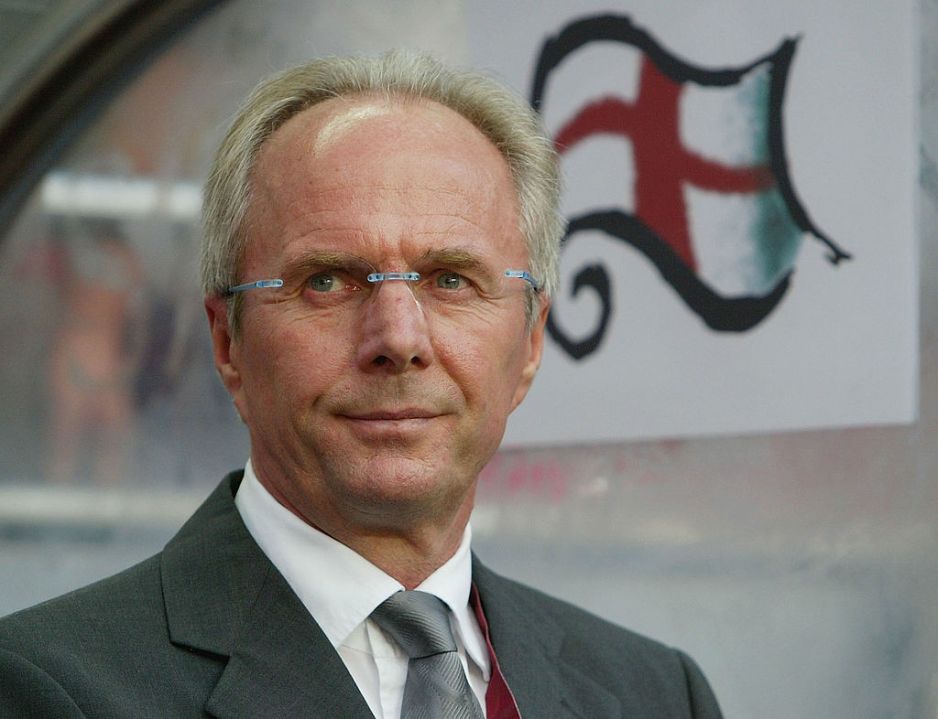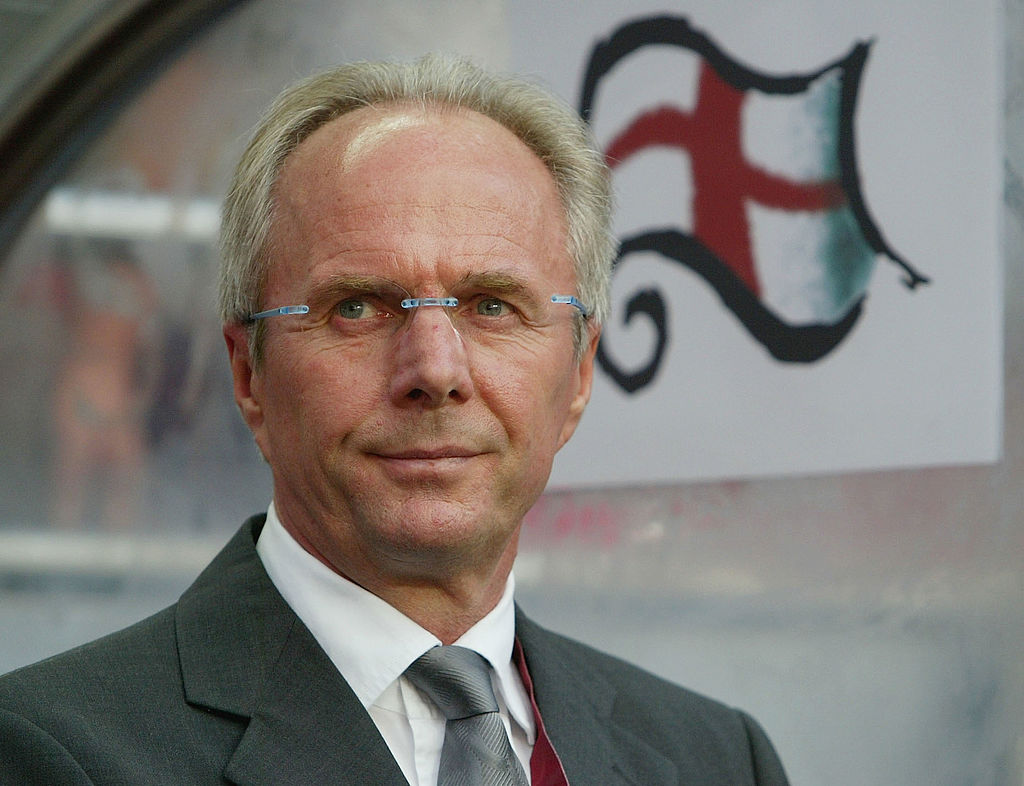Sven-Goran Eriksson, who has died aged 76, was an unlikely choice for the England job in 2000. He was inexperienced with English football – his only exposure having been as young visiting coach in 1978 when Bobby Robson invited him to sit in the dugout during an Ipswich match. But Sven was a serial winner. He had just won the Italian league, the toughest in the world, with Lazio, the club’s first title in 30 years. Before that, he had won 17 trophies over two decades at clubs in Sweden, Portugal and Italy.
The Football Association had burned through top English managers in the previous decade. Bobby Robson was let go; Graham Taylor resigned; Terry Venables left over dodgy business dealings; Glenn Hoddle was sacked after making some unwise comments about disabled people; Kevin Keegan quit after a humiliating 1-0 defeat to Germany at the last game at Old Wembley stadium. The FA believed that Sven would not only stop the rot but win England’s first trophy since the 1966 World Cup.
Sven, England’s first foreign manager, couldn’t refuse what he called the ‘biggest job in the world’ but conceded it was the ‘toughest’. He was met off the plane with a joke from Tony Blair: ‘who will keep our job longer, you or me? Because we both know they’re impossible.’ The tabloids greeted him with hostility, with one columnist accusing the FA of ‘selling the nation’s birthright down the fjord to a nation of seven million skiers and hammer-throwers’. But Sven was used to unkind receptions. When he took the Benfica job in Lisbon in 1982, 18 of the directors resigned in protest over his appointment – he faced a board meeting so hostile that the club chairman faked a heart attack and escaped in an ambulance. It didn’t faze him. After winning the cup and league in his first season, he became a cult hero with the fans.
Sven was set for a similar, heroic trajectory with England. He won his first five games, placating fears among the fans, and built much needed momentum for a squad which was slowly forming around the first crop of the ‘Golden Generation’: David Beckham, Paul Scholes, Steven Gerrard, Rio Ferdinand and Michael Owen.
The crucial fixture was the return match against Germany, following that humbling game in England only eleven months before. England won 5-1, and Owen scored a historic hat trick. Oddly, Sven’s post-match reaction was rather muted: ‘5-1 here is maybe too much.’ Many took his comments for dullness – former England striker Ian Wright later accused Sven of having as much passion as a tadpole – but it was a classic case of Scandinavian directness. Sven knew that the win, immediately etched into the national psyche, would be worthless if England didn’t win their next World Cup qualifier. The English ‘never understood that the Germany game was like any other’, he said. He knew his reputation with the press, and also the fans, could oscillate after every performance.
Sven resented the press for nosing around in his private life. The story of his affair with Ulrika Jonsson was a distraction for the national team, who were just six weeks away from playing in the 2002 World Cup. The same distractions would overshadow the immediate aftermath of the 2004 Euros, when news broke of Sven’s affair with Faria Alam, a secretary at the FA.
It wasn’t the first time Sven had ‘played away’, as the papers called it. When managing Sampdoria in the early 1990s, he cheated on his wife and it ended his marriage. At Lazio he had an affair with the actress Debora Caprioglio. The Italian newspaper Il Messaggero prepared to print the story but Lazio officials threatened to bar the paper from all future press conferences. Sven was annoyed that the same approach couldn’t be taken with the English press; he complained bitterly about the different attitudes in Italy and England. ‘In Italy, they say “wow, congratulations you have a beautiful woman!”’ Where in Italy he had cut a debonair figure, in England the mild mannered Swede was a calamitous Casanova.
Recently, some players have criticised Sven’s scandal- and gossip-filled tenure. Defender Rio Ferdinand said the media frenzy around the training camp during the 2006 World Cup was ‘like a circus’, and made football a ‘secondary element.’ Some players have blamed the press for losses in the 2002 and 2004 tournaments.
So great was the expectation of success from fans and the press that many accused Sven of wasting England’s ‘Golden Generation’. Even today, pub pundits make the same arguments as they did nearly 20 years ago: ‘Why did he play 4-4-2?’ for 2002; ‘You can’t play Scholes on the left!’ for 2004; and ‘If only he had used a diamond in midfield…’ for 2006. It comes down to an assumption that Sven didn’t know how to handle the great players he had at disposal. They forget that, before managing England, he achieved success with some of the world’s best ever players, men like Zbigniew Boniek, Roberto Baggio and Ruud Gullit, and lineups that included Alessandro Nesta, Juan Sebastian Veron and Pavel Nedved. Tactically he inspired many of his other players who became top managers, Carlo Ancelotti, Diego Simeone and Roberto Mancini.
The loss to Portugal in 2006 was Sven’s last game as England manager. Wayne Rooney lost his composure for a brief moment and stamped on Ricardo Carvalho, and got a red card. The rest of the game was on a knife-edge, and England lost on penalties (again). Sven had already been told he was finished before England left the tournament, following a Fake Sheikh sting over a cushy job at Aston Villa. Sven perceived it as a final attack from the hostile media and another failure from a cowardly FA. He lamented that the England job was one ‘that holds you hostage until it spits you out.’
Sven had taken an inconsistent team and turned it into a side that would go on to qualify in first place for each tournament it entered, only losing five competitive matches in the process. As a club manager he would have been considered successful – but he was not suited for the international game or the pressures of the English tabloids. The FA’s first choice successor, Felipe Scolari, who had knocked out England at Sven’s three tournaments, rejected the job after seeing Sven’s ordeal: ‘There have been 20 journalists camped outside my house… It may be part of another culture, but it’s not part of mine.’ History will be kinder to Sven than the press was. He raised the calibre of England’s team, so the public no longer just hope to qualify for every tournament – we expect to be able to win them too. Sven’s last words as England manager were quietly spoken: ‘I would like to be remembered as an honest man who did his best.’









Comments